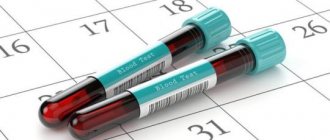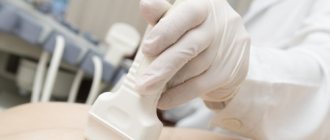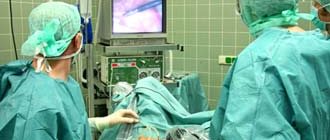To make a correct diagnosis and effectively get rid of problems associated with the female reproductive system, the endocrinologist prescribes an examination of general hormonal levels. Blood from a vein is needed to determine hormone levels:
- T3 general and free;
- TSH;
- T4 general and free;
- Antibodies to TG and TPO;
- Antibodies to rTSH;
- paratrohormone;
- calcitonin.
On what day of the cycle is it best to take a test for TSH, T3, T4? Each type of hormone is unique and capricious in its own way, sensitive to external factors. The level of some of them depends qualitatively on the day of the menstrual cycle. When should you donate blood for hormones? What day?
The analysis for the above TSH, T3, T4 does not depend on the day of the menstrual cycle. You need to donate blood on an empty stomach or no earlier than five hours after eating. During periods of exacerbation of viral diseases, it is better to postpone testing. The hormonal level depends on what diet the patient prefers and on the level of his physical activity.
What is the T3 hormone and its functions?
Content:
- What is the T3 hormone and its functions?
- Indications for prescribing a blood test for T3
- Preparation and carrying out the procedure
- Norms for general T3
- Increased T3 levels
- Decreased T3 levels
- Summing up
Triiodothyronine exists in the human body in two forms: free and bound. The combination of these two forms forms the total triiodothyronine. This hormone is formed not only during the breakdown of thyroxine, but is also produced in a certain amount by the thyroid gland in finished form. Afterwards, in the blood plasma, most of the T3 is bound to albumins, globulins and prealbumins. It is these proteins that transport hormones to different places in the body. But just the part that does not come into contact with such proteins is called free triiodothyronine. Most often, they are tested for free, and in some cases for total, T3 hormone, since then you can see a more complete picture of the changes occurring in the hormonal background.
Thyroid hormone T3 helps normalize energy metabolism in the human body, in other words, it receives energy from food and helps to spend it appropriately.
One of the important functions of triiodothyronine is to ensure the normal physical development of the internal organs and systems of the embryo, so it is quite important to monitor the level of T3 in pregnant women, as well as in those who are planning to have a child.
In addition, triiodothyronine has a significant effect on the central nervous system. Therefore, an increase in the blood of this hormone significantly increases nervous excitability. People suffering from thyrotoxicosis are very easy to lose their temper; they are irritable, quick-tempered and extremely emotional.
However, the most important role of the T3 hormone test is to diagnose possible pathological changes in the thyroid gland and disruption of the endocrine system as a whole.
Other functions of the T3 hormone include:
- stimulating the body's production of retinol;
- participation in metabolic processes;
- improvement of metabolism;
- normalization of heart rate;
- reducing the level of bad cholesterol in the blood;
- normalization of nervous processes;
- relieving overexcitability;
- active participation in cell regeneration;
- ensuring cellular respiration of internal organs and tissues.
Estradiol
It has a versatile effect on all female genital organs. Its role is especially important in the development of the uterine mucosa and preparing it for pregnancy. This hormone is secreted by the maturing follicle, corpus luteum of the ovary, adrenal glands and even adipose tissue under the influence of FSH, LH and prolactin. In women, estradiol ensures the formation and regulation of menstrual function and the development of the egg. A woman ovulates 24-36 hours after a significant peak in estradiol. After ovulation, the hormone level decreases, and a second, smaller amplitude, rise occurs. Then there is a decline in the concentration of the hormone, which continues until the end of the luteal phase.
Indications for prescribing a blood test for T3
A blood test for the level of triiodothyronine in the body is necessary in order to track and diagnose possible pathologies of the thyroid gland and endocrine system. It is also prescribed when the patient has symptoms of hyperthyroidism - a significant increase in the content of thyroid hormones.
An analysis of total T3 is also necessarily included in hormonal screening of the thyroid gland in the following conditions:
- tendency to swelling;
- unreasonable change in the patient's weight;
- dysfunction of the pituitary gland and thyroid gland;
- painful menstruation;
- menstrual irregularities;
- significantly pronounced PMS symptoms.
You should also be aware that in some diseases, such as thyroid adenoma or toxic nodular diffuse goiter, formations may appear that additionally produce the T3 hormone, which ultimately leads to T3 toxicosis.
Then such an examination is prescribed in order to check the effectiveness of the treatment received by the patient.
What the results will tell you
When the tests are completed and the results are received, they must be deciphered as accurately as possible. This can only be done by an experienced specialist who will take into account age, emotional state and other important factors. The doctor compares the existing indicators with reference indicators.
The normal level of the TSH hormone is 0.4-4.0 mU per liter. An increase in indicators prompts the doctor to think about diseases such as hypothyroidism, thyrotoxicosis, adrenal gland pathologies, and mental disorders. Low levels indicate that the pituitary gland is not active enough.
Free (free) and total T4 are normal 9-22 pmol per liter. Inflated results indicate the development of various endocrine pathologies.
Preparation and carrying out the procedure
A person’s hormonal background is very sensitive to many different factors, which is why proper preparation for taking a hormone test is very important.
For the most reliable results when testing blood for free and total triiodothyronine, you need to follow a few simple rules:
- Donate blood in the morning and always on an empty stomach.
- On the eve of the test, avoid physical exercise.
- The day before the procedure, avoid eating fatty foods and alcoholic drinks.
- Stop taking any medications. If the patient is undergoing treatment, the test must be taken a week after its completion.
- Women who are taking oral contraceptives during the test should stop taking the drug, replacing it with non-hormonal methods of contraception.
Blood sampling for hormonal studies is carried out in the laboratory using sterile disposable instruments. This analysis is carried out using direct chemiluminescent immunoassay.
Before donating blood, it is advisable for the patient to sit in complete peace for five to ten minutes to improve the results of the examination.
How to properly prepare for a prolactin test
In order for the results of laboratory diagnostics to be as reliable as possible, the patient must follow certain rules during the day before the blood is drawn.
You must continue your normal lifestyle for 24 hours. It is necessary to be moderate in everything. Any load can distort the results of the study.
An important point is to abstain from sexual activity on the eve of the study. Sexual intercourse can temporarily increase prolactin levels by 2-3 times.
It is necessary to avoid irritation of the areola area. Touching or wearing tight underwear can stimulate hormone production.
The day before the blood test, avoid thermal procedures. It is better to reschedule baths, saunas, and hot baths until the next day.
The evening before your blood draw, eat in moderation. You should not eat a lot of protein foods (meat, cottage cheese, legumes, etc.). You shouldn't go hungry either. It is best to prepare a light vegetable dinner. A minimum of 8 hours must pass from the last meal to the time of taking the test.
Try to go to bed early enough. Lack of sleep is a powerful stimulus for increasing prolactin levels. Each person has individual needs for time to rest at night. Most often, an adult needs 7–8 hours of sleep.
Norms for general T3
Deciphering the obtained analysis results should be carried out by the attending physician; you should not decipher the data yourself, even though the required standards are usually indicated on standard forms. A specialist will help you correctly process the results obtained, based not only on the given standards, but also on the patient’s medical history, his individual characteristics and other studies. Based on all this, the necessary treatment is prescribed.
It should also be taken into account that the hormone standards, reagents and equipment in each laboratory may differ significantly, therefore it is necessary to carry out both treatment and diagnosis in the same clinic.
The normal level of total triiodothyronine for adult women and men is from 0.89 to 2.44 nmol/liter. For children, the standards are slightly higher and range from 1.74 to 2.91 nmol/liter.
It should be taken into account that there are several factors that can significantly affect the final result of the analysis:
- taking drugs that reduce the level of T3 in the blood: aspirin, furosemide, androgens, anabolics, cimetidine, amiodarone, atenolol and others;
- taking medications that increase the level of T3 in the blood: lithium preparations, tamoxifen, estrogens, methadone and clofibrate; pregnancy period;
- liver dysfunction, liver diseases;
- elderly age of the patient;
- myeloma;
- somatic diseases in severe form.
Further actions
After the procedure, you should have a snack and drink water. If necessary, take all necessary medications.
When the results are received, the doctor will examine them and, if necessary, prescribe therapy. If the list of medications contains any hormonal drugs, before taking them you should carefully study the instructions and be sure to adhere to the treatment regimen prescribed by your doctor.
At the same time, nutrition can be adjusted. Some hormone levels are easily corrected by nutrition.
Increased T3 levels
When the level of triiodothyronine is elevated, thyrotoxicosis is diagnosed, accompanied by the following pronounced symptoms:
- sleep disorders, insomnia;
- rapid heartbeat, heart rhythm disturbances;
- constant fatigue and increased fatigue;
- emotional lability, increased aggression;
- significant weight loss for no apparent reason;
- menstrual irregularities, enlarged mammary glands in men;
- frequent urination, digestive system disorders.
However, you should know that if a significant increase in the T3 hormone is diagnosed with normal levels of other endocrine hormones, it is considered to be a false positive result.
An increase in the level of triiodothyronine in the body indicates the presence of diseases such as thyroiditis - an autoimmune disease of the thyroid gland, hyperthyroidism, thyroid adenoma, Graves' disease - poisoning of the body with its own thyroid hormones, postpartum dysfunction of the thyroid gland, Pendred syndrome - an increase in the size of the thyroid gland at the genetic level.
The list of diseases also includes nephrotic syndrome - a kidney disease characterized by severe swelling, independent TSH thyrotoxicosis or isolated T-thyrotoxicosis, resistance to endocrine hormones.
Progesterone
After ovulation - the release of an egg from the follicle - a corpus luteum is formed in its place in the ovary - a gland that secretes progesterone - the pregnancy hormone. It exists and secretes this hormone during 12-16 weeks of pregnancy until the moment when the placenta is fully formed and takes over the function of hormone synthesis.
If conception does not occur, the corpus luteum dies after 12-14 days, and menstruation begins. Progesterone is determined to assess ovulation and the viability of the corpus luteum. With a regular cycle, progesterone levels are determined a week before menstruation (in the middle of the second phase), when measuring rectal temperature - on the 5-7th day of its rise, with an irregular cycle - several times. A sign of ovulation and the formation of a full-fledged corpus luteum is a tenfold increase in progesterone levels.
In addition to the ovaries, like all sex hormones, progesterone is produced in the adrenal glands.
In women, the normal concentration of progesterone depends on the phase of the menstrual cycle and is maximum in the middle of the luteal phase. In postmenopause, progesterone concentrations decrease to the level found in men. When pregnancy occurs, progesterone levels increase until the 40th week of pregnancy. A decrease in plasma progesterone concentration is observed when there is a threat of miscarriage.
Reasons for increased progesterone levels:
- genetic features of the synthesis of sex hormones in the adrenal glands (adrenal cortical hyperplasia)
- corpus luteum cyst
- pregnancy
- hydatidiform mole
Reasons for low progesterone levels:
- lack of ovulation
- corpus luteum deficiency
- threatened abortion
Decreased T3 levels
A decrease in the level of triiodothyronine in the body indicates problems with the secretory function of the thyroid gland. This is accompanied by a decrease in the level of other endocrine hormones. Symptoms of a decrease in T3 in the body are as follows:
- decrease in body temperature, characteristic of loss of strength;
- development of convulsive syndrome;
- increased fatigue, drowsiness, lethargy;
- muscle and ligament weakness;
- violation of potency;
- nausea and vomiting, loss of appetite, susceptibility to frequent constipation;
- increased swelling.
In some cases, a slight decrease in triiodothyronine is not a pathology. For example, in the third trimester of pregnancy, this phenomenon is considered normal.
In all other cases, these symptoms are characteristic of the following diseases:
- thyroid insufficiency;
- diffuse or nodular toxic goiter;
- renal failure, renal dysfunction, liver cirrhosis;
- a nervous form of anorexia;
- fasting, dieting;
- iodine deficiency in the body;
- operations on the thyroid gland.
Testosterone
Testosterone is a male sex hormone. Formed in the gonads and adrenal cortex. Like female sex hormones, it has receptors in many systems and tissues of the body. Responsible for the development of secondary sexual characteristics, psychological awareness of gender, maintenance of sexual function (libido and potency), sperm maturation, development of the skeleton and muscle mass, stimulates the bone marrow, the activity of the sebaceous glands, improves mood.
In women, testosterone concentration is related to the menstrual cycle. Thus, the maximum concentration is determined in the luteal phase and during the period of ovulation.
Testosterone also has a daily rhythm of secretion: minimum at 20.00, maximum at 7.00.
In women, drinking alcohol during menopause, as well as menopause itself, burns, a low-fat diet, and poor nutrition cause a decrease in total testosterone. Smoking can cause both an increase in total and free testosterone and a decrease in total testosterone. Weight loss in obese women causes a decrease in free testosterone. During heat stress, both men and women experience a decrease in total testosterone.
Reasons for increased testosterone levels:
- premature puberty (in boys)
- adrenal hyperplasia
- tumors that produce sex hormones
Causes of low testosterone:
- Down syndrome
- renal, liver failure
- insufficiency of development of the gonads
Summing up
A blood test for T3 is prescribed by the attending physician if a disorder of the thyroid gland or endocrine system is suspected. Such diagnostics are quite complex, so it is extremely important to properly prepare for it, since even the slightest deviation can lead to false results. Such an analysis must be carried out in specialized laboratories where there is advanced modern equipment that will eliminate various inaccuracies.
More fresh and relevant information about health on our Telegram channel. Subscribe: https://t.me/foodandhealthru
We will be grateful if you use the buttons:
Cortisol
Cortisol is a hormone of the adrenal cortex. Determined to assess the function of the adrenal cortex. Reacts to stress and has a daily rhythm of secretion. Regulated by the pituitary hormone ACTH.
The daily rhythm of cortisol secretion is formed approximately by the 3rd year of life and is manifested by higher concentrations of the hormone during the daytime and lower concentrations at night. The maximum level of cortisol in plasma and urine is determined from 4 to 8 o'clock (peak from 4 to 6 o'clock), the minimum - from 21 to 3 o'clock. The concentration of cortisol in serum at 20 o'clock differs from the concentration at 8 o'clock by more than 50%.
Various types of stress (psychological, physical, cold, heat, etc.), bulimia, alcohol intake, alcoholism, physical activity, electrovascular therapy, fasting, eating, premenstrual syndrome (hot flashes in menopause), smoking, surgical operations, injuries, uremia cause increase in plasma cortisol.
Causes of elevated cortisol levels:
- Cushing's disease (excess ACTH)
- adrenal tumor
Reasons for decreased cortisol levels:
- adrenal insufficiency
- adrenogenital syndrome (genetic disorder of the synthesis of steroid hormones of the adrenal cortex)
- pituitary insufficiency
Dehydroepiandrosterone sulfate DHA-S (DHEA-S)
DHA-S (DHEA-S) is a male sex hormone synthesized in the adrenal cortex. Determined to diagnose the origin of hyperandrogenism (excess of male sex hormones) in women.
Preparation for DEA-S analysis: On the eve of the study, it is necessary to exclude medications that affect the level of DEA-S in plasma, physical activity, smoking, administration and intake of glucose.
In newborns, especially premature infants, the concentration of DHEA-S in plasma is increased, then sharply decreases during the first week of life. Several years before puberty and during this period, the plasma concentration of DHEA-S increases. Further, with age, there is a progressive decline in DHEA-S in men and women. No specific circadian rhythm has been identified for this hormone. During pregnancy, its concentration in plasma decreases.
Alcoholism, taking 75 g of glucose, and severe illnesses cause a decrease in DHEA-S. Physical activity, fasting, smoking – increase.
Reasons for increased DHA-S levels:
- adrenal hyperandrogenism (adrenal hyperplasia, tumors, Cushing's disease)
Reasons for low DHA-S levels:
- adrenal insufficiency











